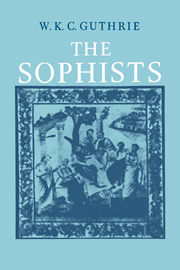Book contents
- Frontmatter
- Contents
- List of Abbreviations
- Preface
- I INTRODUCTION
- II TOPICS OF THE DAY
- III WHAT IS A SOPHIST?
- IV THE ‘NOMOS’ – ‘PHYSIS’ ANTITHESIS IN MORALS AND POLITICS
- V THE SOCIAL COMPACT
- VI EQUALITY
- VII THE RELATIVITY OF VALUES AND ITS EFFECTS ON ETHICAL THEORY
- VIII RHETORIC AND PHILOSOPHY (Seeming and being, believing and knowing, persuading and proving)
- IX RATIONALIST THEORIES OF RELIGION: AGNOSTICISM AND ATHEISM
- X CAN VIRTUE BE TAUGHT?
- XI THE MEN
- Bibliography
- Index of passages quoted or referred to
- General Index
- Index of selected Greek words
- Frontmatter
- Contents
- List of Abbreviations
- Preface
- I INTRODUCTION
- II TOPICS OF THE DAY
- III WHAT IS A SOPHIST?
- IV THE ‘NOMOS’ – ‘PHYSIS’ ANTITHESIS IN MORALS AND POLITICS
- V THE SOCIAL COMPACT
- VI EQUALITY
- VII THE RELATIVITY OF VALUES AND ITS EFFECTS ON ETHICAL THEORY
- VIII RHETORIC AND PHILOSOPHY (Seeming and being, believing and knowing, persuading and proving)
- IX RATIONALIST THEORIES OF RELIGION: AGNOSTICISM AND ATHEISM
- X CAN VIRTUE BE TAUGHT?
- XI THE MEN
- Bibliography
- Index of passages quoted or referred to
- General Index
- Index of selected Greek words
Summary
The third volume of my History of Greek Philosophy (Cambridge University Press, 1969) was divided into two parts, entitled respectively ‘The World of the Sophists’ and ‘Socrates’. By issuing the two parts separately in paperback form, the Press hopes to make them more easily and cheaply available to students. This book reproduces the first part, with the minimum of alterations necessary to allow it to appear as a separate publication. Mentions of ‘vol. I’ or ‘vol. II’ in the text refer to the earlier volumes of this work.
The original title for the first part was chosen to mark the fact that it is impossible to understand the Sophists without taking into account a wider circle of writers and indeed the general contemporary climate of thought. Philosophy in the middle of the fifth century B.C. was closely bound up with problems of practical living, with views on morals and politics and the origin and purpose of organized societies, and the biggest difficulty which it presented was that of setting limits to the subject. What an authority on the eighteenth century has said of the philosophes of that epoch is equally true of the Sophists, namely that ‘while the Enlightenment was a family of philosophes, it was something more as well: it was a cultural climate, a world in which the philosophes acted, from which they noisily rebelled and quietly drew many of their ideas, and on which they attempted to impose their programme’. One cannot isolate the Sophists from their contemporary world, from writers like Thucydides, Euripides, Aristophanes and the orators, while at the same time any tendency to allow the volume to develop into a history of Greek literature had, for obvious reasons, to be resisted.
A recent writer has remarked on the powerful impact which has always been made by fresh and immediate contact with the great minds of ancient Greece.
- Type
- Chapter
- Information
- A History of Greek Philosophy , pp. 1 - 2Publisher: Cambridge University PressPrint publication year: 1977

